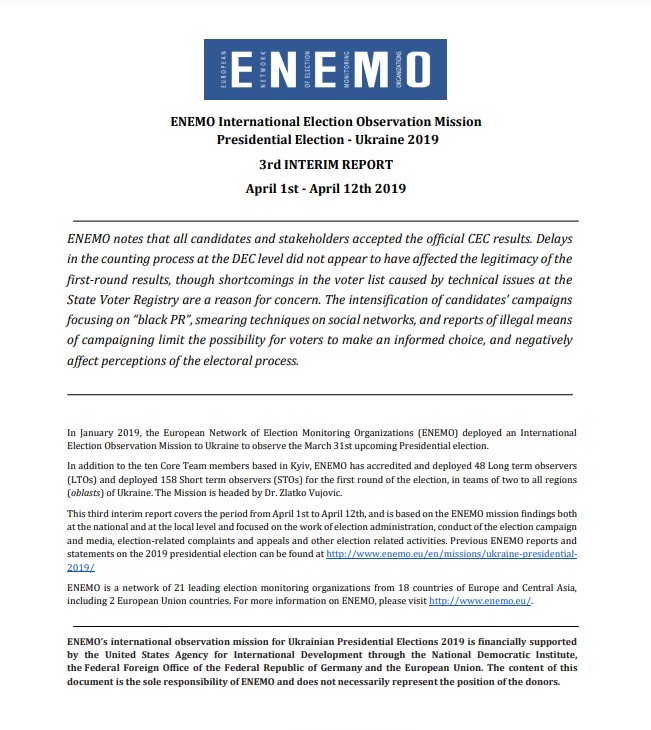Kyiv, April 15, 2019 - ENEMO notes that all candidates and stakeholders accepted the official CEC results. Delays in the counting process at the DEC level did not appear to have affected the legitimacy of the first-round results, though shortcomings in the voter list caused by technical issues at the State Voter Registry are a reason for concern. The intensification of candidates’ campaigns focusing on “black PR”, smearing techniques on social networks, and reports of illegal means of campaigning limit the possibility for voters to make an informed choice, and negatively affect perceptions of the electoral process.
This was concluded in the Third Interim report for the period April 1st - April 12th 2019, published by ENEMO International election observation Mission (IEOM) to Ukraine.
“Candidates did not contest the official CEC results, despite earlier announcements that they would not accept a defeat. The second round of elections will be held on April 21st, with Volodymir Zelenskiy and Petro Poroshenko competing for the majority of votes”, states the report.
On April 10th, the CEC formed 199 DECs and appointed 14 members to each commission – seven nominees from each candidate.
“The total number of DEC members in 199 DECs is 2,786. Among them 60.01% are women and 39.98% are men”, states the report.
The total number of expected PECs for the second round is 29,806.
“Concerns remain about the level of professionalism, experience, and training of PEC members. In isolated cases, ENEMO observers reported that DECs were expecting challenges in identifying and appointing PEC members by the prescribed deadline, should the candidates fail to submit sufficient number of nominees” quoted the report.
As of April 12th, 201,189 voters had registered for temporary change of their place of voting.
“The highest number of requests was observed in Kyiv city (34,318 voters), Kyiv district (20,383 voters), and Kharkiv district (14,623 voters). Vast number of these requests was submitted by IDPs and voters originating from occupied territories”, states the report.
ENEMO interlocutors, including heads of State Registry departments explained that issues with the voter lists mostly resulted from the lack of electronic feedback from the website of the State Registry.
“Based on the available information, ENEMO remains concerned that shortcomings in voters’ lists may not be resolved ahead of the second round”, quoted in the report.
Negative campaigning and aggressive rhetoric by both candidates have marked the period between the two election rounds.
“Black PR” tactics and smear campaigns were the main focus of candidate’s campaign strategies, who used social media platforms for spreading negative messages on their opponent, which were then further spread by traditional media. These contained defamation techniques, including humiliating picture-collages, fake news, and aggressive name-calling”, states the report.
ENEMO raises concerns with regard to the use of illegal campaign materials, printed and digital, which use false information aiming at discrediting the credibility and dignity of candidates.
“ENEMO also notices the lack of sanctions enforced upon candidates in this regard”, quoted in the report.
Both candidates started a series of promotional video exchanges and discussions regarding the place and conditions of televised debates, before the CEC declared the election results and announced the second round.
“Such activities may be perceived as election campaigning, but ambiguous provisions of the presidential election law leave room for interpretation, allowing contestants to use legal loopholes to their advantage”, states the report.
ENEMO notes the importance of presidential debates, which are an essential platform for giving voters the opportunity to hear candidates discuss and debate key issues prior to elections, while increasing the degree of transparency and accountability of candidates at the same time.
“The election dispute resolution process continues to illustrate ambiguity of regulations. A high number of complaints were dismissed on procedural grounds and were not investigated based on merit of their claims”, states the report.
On Election Day and the post-election period, the majority of complaints were submitted to the police.
“Police recorded all complaints, however the majority of these cases remain unaddressed since they were categorized as “unclassified” or “other”. A considerable number of complaints, both verbal and written, submitted to the police were related to issues with the voter lists”, quoted in the report.
Disclaimer: ENEMO’s international observation mission for Ukrainian Presidential Election 2019 is financially supported by the United States Agency for International Development through the National Democratic Institute, the Federal Foreign Office of the Federal Republic of Germany and the European Union. The content of the document is the sole responsibility of ENEMO and does not necessarily represent the position of its donors.
